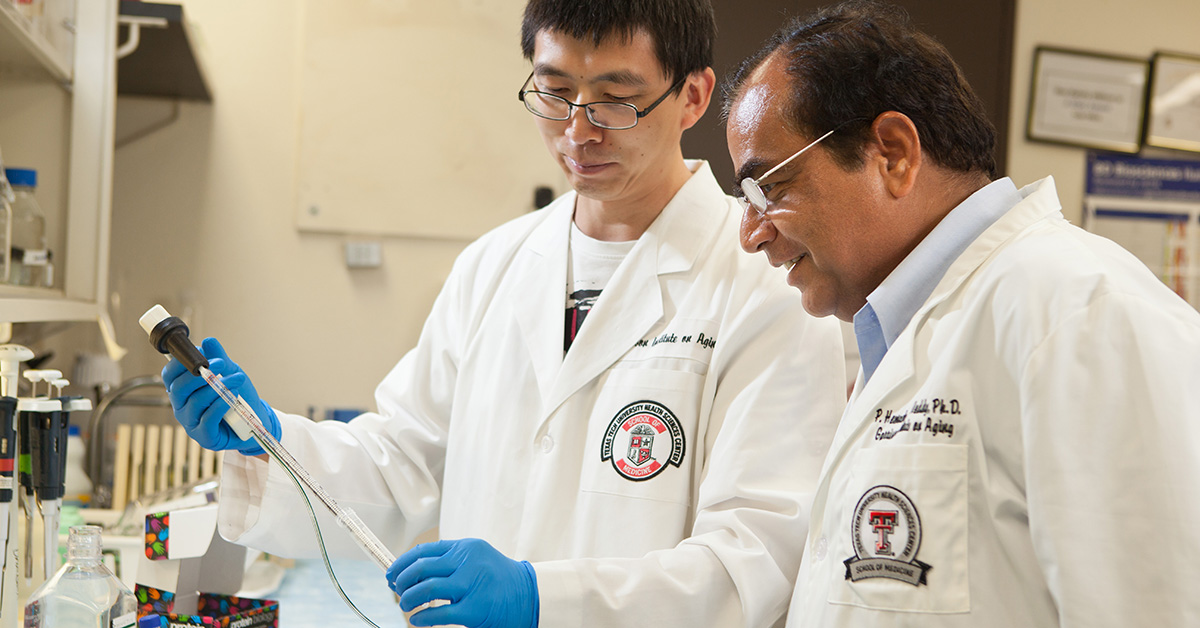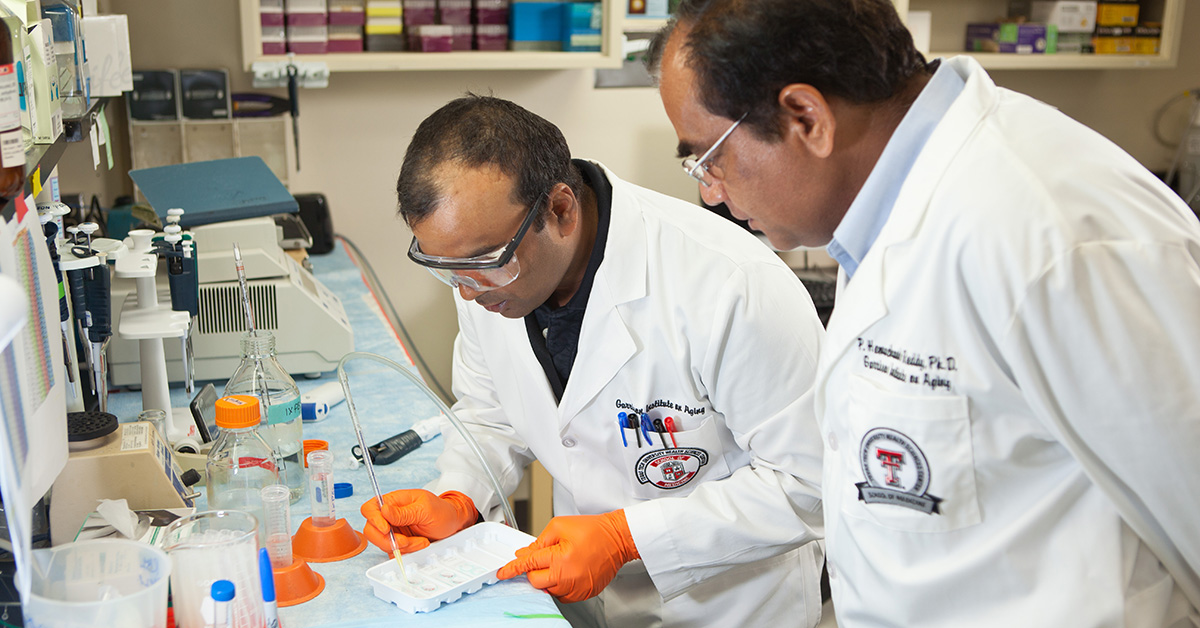TTUHSC Researcher Receives National Institutes of Health Grant

The National Institutes of Health (NIH) awarded P. Hemachandra Reddy, Ph.D., the executive director and chief scientific officer of Texas Tech University Health Sciences Center Garrison Institute on Aging, a $1.9 million, five-year R01 grant from the Neurological Disorders and Stroke Institute of the National Institutes of Health.
Reddy’s grant, “Mitochondrial Fragmentation and Neurodegeneration in Huntington’s Disease,” will study the protective effects of mitochondria division inhibitor 1 (Mdivi1) that inhibits excessive mitochondrial division in mouse models of Huntington’s disease. The research is an extension of Reddy’s postdoctoral work he conducted at the National Human Genome Research Institute of the NIH.
Huntington’s disease is a fatal genetic disorder that causes the degeneration of brain cells in the motor control regions of the brain. Huntington’s disease typically begins between 30 and 50 years of age, and its symptoms progressively worsen. These symptoms include impaired coordination and uncontrolled movements of the limbs (chorea), abnormal body posture, and changes in behavior, emotion, judgment and cognition. People with Huntington’s disease also develop impaired slurred speech and difficulty swallowing. Currently, more than 30,000 Americans have the disease.
The Huntington’s disease gene was identified in 1993 and was found to carry an expanded polyglutamine repeats or CAG repeats as a dominant mutation in a protein called huntingtin. Since the discovery of the gene, tremendous progress has been made in understanding the biology of huntingtin, which has been found to target neurons in the midbrain region. Research from the Reddy Laboratory at the TTUHSC Garrison Institute on Aging has implicated multiple cellular changes in Huntington’s disease-affected neurons during Huntington’s disease progression, including abnormal mitochondrial dynamics, defective energy metabolism, abnormal protein-protein interactions, defective axonal transport and synaptic damage.
Reddy and his research team studied the mitochondrial defects in Huntington’s disease-affected neurons. Recently, they identified a cause of mitochondrial defects in Huntington’s disease-affected neurons and the interaction between the mutant huntingtin and Drp1, a mitochondrial division protein. The research found that an increase in Drp1 leads to excessive fragmentation of mitochondria.
In the newly funded NIH research, Reddy and his research team will determine whether a partial reduction of Drp1 protects Huntington’s disease-affected neurons from excessive mutant huntingtin-induced fragmentation of mitochondria, mitochondrial dysfunction and synaptic toxicities. Both genetic and pharmacological approaches to determine the effects of reduced Drp1 in Huntington’s disease-affected neurons will be used.
The outcome of Reddy’s research will clarify the genetic and pharmacological strategies that may reduce excessive mitochondrial fragmentation and thus increase neuronal survival and synaptic functions in Huntington’s disease-affected neurons.

Related Stories
Celebrating Veterans: TTUHSC’s General Martin Clay’s Legacy of Service and Leadership
From his initial enlistment in the Army National Guard 36 years ago to his leadership in military and civilian health care management roles, Major General Martin Clay’s career has been shaped by adaptability, mission focus and service to others.
Texas Tech University Health Sciences Center School of Nursing Named Best Accelerated Bachelor of Science in Nursing Program in Texas
The TTUHSC School of Nursing Accelerated Bachelor of Science in Nursing (BSN) program has been ranked the No. 1 accelerated nursing program in Texas by RegisteredNursing.org.
TTUHSC Names New Regional Dean for the School of Nursing
Louise Rice, DNP, RN, has been named regional dean of the TTUHSC School of Nursing on the Amarillo campus.
Recent Stories
The John Wayne Cancer Foundation Surgical Oncology Fellowship Program at Texas Tech University Health Sciences Center Announced
TTUHSC is collaborating with the John Wayne Cancer Foundation and has established the Big Cure Endowment, which supports the university’s efforts to reduce cancer incidence and increase survivability of people in rural and underserved areas.
TTUHSC Receives $1 Million Gift from Amarillo National Bank to Expand and Enhance Pediatric Care in the Panhandle
TTUHSC School of Medicine leaders accepted a $1 million philanthropic gift from Amarillo National Bank on Tuesday (Feb. 10), marking a transformational investment in pediatric care for the Texas Panhandle.
Texas Tech University Health Sciences Center Permian Basin Announces Pediatric Residency Program Gift
TTUHSC Permian Basin, along with the Permian Strategic Partnership and the Scharbauer Foundation, Feb. 5 announced a gift that will fund a new pediatric residency.
